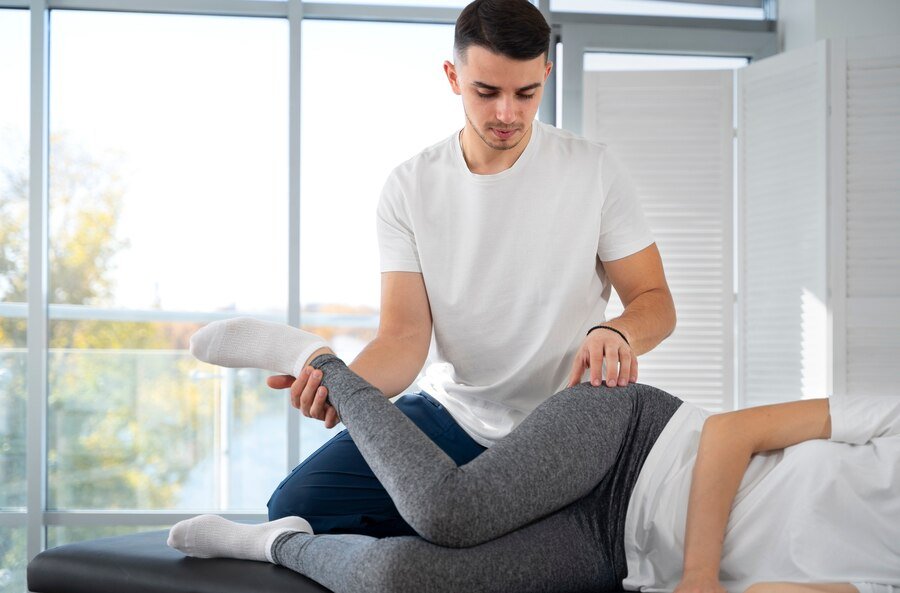How Physiotherapy Can Help Relieve Hip Pain?
Are you experiencing persistent hip pain? Do you struggle with daily activities like walking or climbing stairs due to discomfort in your hips? Hip pain can significantly impact your quality of life. However, there is good news. Physiotherapy offers effective solutions for managing and relieving hip pain. At Backbone Physiotherapy, we provide expert Hip Pain Treatment in Gurgaon, using a variety of techniques to help you recover and return to your normal activities. In this blog, we’ll explore how physiotherapy can be a game-changer in managing hip pain and improving your mobility.
Understanding Hip Pain
Hip pain occurs for several reasons. It may stem from injuries, aging, overuse, or underlying conditions like arthritis. Some common causes include:
- Osteoarthritis: A condition that causes the cartilage in the hip joint to wear down.
- Bursitis: Inflammation of the fluid-filled sacs that cushion the joints.
- Tendinitis: Inflammation of the tendons surrounding the hip joint.
- Muscle Strains: Overstretching or overloading of the muscles can lead to pain.
When hip pain persists, it can make even simple movements painful. This is where physiotherapy comes in.
How Physiotherapy Helps with Hip Pain?
Physiotherapists are experts in managing and treating musculoskeletal conditions. They help patients reduce pain, restore function, and prevent further injury. Physiotherapy can benefit individuals with hip pain by:
1. Strengthening the Muscles Around the Hip
One of the main goals of physiotherapy for hip pain is to strengthen the muscles surrounding the hip joint. When these muscles become weak, it puts more stress on the joint, worsening the pain. A physiotherapist will guide you through specific exercises designed to target these muscles, improving their strength and stability.
For example, exercises focusing on the glutes, quadriceps, and hamstrings can help relieve strain on the hip joint and provide better support.
2. Improving Flexibility and Range of Motion
Hip pain can limit your movement, making it difficult to bend or rotate your hip. Physiotherapists use stretching and mobility exercises to increase flexibility and restore a full range of motion. They will work with you to improve your hip’s flexibility, which reduces stiffness and discomfort.
With increased mobility, you’ll notice a reduction in pain when performing daily activities like sitting, standing, and walking.
3. Posture Correction and Alignment
Poor posture and body alignment can lead to added stress on your hips, causing pain over time. A physiotherapist will assess your posture and suggest corrections that can reduce the strain on your hip joint. They may recommend lifestyle changes, ergonomic adjustments at work, or exercises to promote better posture, which helps manage and prevent hip pain.
4. Manual Therapy for Pain Relief
Manual therapy involves hands-on techniques used by physiotherapists to alleviate pain and improve movement. This may include joint mobilizations, soft tissue massage, and myofascial release. These techniques help release muscle tension, increase blood flow, and promote healing in the affected area.
Manual therapy can offer immediate relief from hip pain, and regular sessions can improve long-term recovery.
5. Education and Advice on Activity Modification
A physiotherapist will provide valuable guidance on modifying activities to prevent exacerbating your hip pain. They will teach you proper body mechanics, recommend low-impact exercises, and advise on how to safely perform daily tasks to minimize stress on the hip.
For example, switching to exercises like swimming or cycling instead of running can help you stay active without worsening your condition.
6. Pain Management Techniques
Physiotherapists are skilled in a variety of pain management techniques. These techniques include the use of modalities such as heat, ice, and electrical stimulation, all of which can help reduce inflammation and provide pain relief. By combining these techniques with exercises, physiotherapy offers an integrated approach to hip pain treatment.
When Should You Consider Physiotherapy for Hip Pain?
Physiotherapy can be highly beneficial for individuals suffering from both acute and chronic hip pain. Here are a few signs that it may be time to seek Hip Pain Treatment in Gurgaon:
- You experience ongoing discomfort in your hip, even at rest.
- Pain prevents you from performing daily tasks, such as walking or climbing stairs.
- You have limited range of motion and cannot move your hip freely.
- You have tried other treatments without seeing significant improvement.
- You want to avoid surgery or reduce the need for pain medications.
If you recognize any of these symptoms, consulting a physiotherapist can help you take control of your hip health.
Why Choose Backbone Physiotherapy for Hip Pain Treatment in Gurgaon?
At Backbone Physiotherapy, we specialize in Hip Pain Treatment in Gurgaon and offer personalized care to address the root cause of your pain. Our team of experienced physiotherapists uses advanced techniques and state-of-the-art equipment to ensure that you receive the best possible care.
We focus on:
- Individualized Treatment Plans: Every patient is unique, and so is their treatment. We create a customized treatment plan based on your specific condition and goals.
- Expert Care: Our team consists of qualified physiotherapists with years of experience in treating hip pain and other musculoskeletal issues.
- Comprehensive Approach: From strength-building exercises to manual therapy, we provide a holistic approach to help you recover fully.
- Ongoing Support: We don’t just treat the symptoms. We aim to educate you on maintaining long-term hip health through lifestyle changes, exercises, and proper body mechanics.
The Benefits of Physiotherapy for Hip Pain Relief
Physiotherapy offers many advantages when it comes to managing and treating hip pain. These include:
- Non-invasive Treatment: Unlike surgery, physiotherapy avoids the risks and recovery time associated with invasive procedures.
- Pain Reduction: With targeted exercises and manual therapy, physiotherapy can significantly reduce pain and inflammation.
- Improved Functionality: Physiotherapy helps restore movement, making it easier to perform everyday tasks and participate in physical activities.
- Prevention of Future Injuries: By strengthening muscles and improving flexibility, physiotherapy reduces the likelihood of future hip injuries.
Conclusion
If you’re dealing with hip pain, Backbone Physiotherapy is here to help. Our expert team offers personalized Hip Pain Treatment in Gurgaon that addresses the root cause of your discomfort and restores your mobility. Don’t let hip pain hold you back. Take the first step towards recovery today by contacting us for a consultation.
Ready to live pain-free? Call Backbone Physiotherapy today to schedule your appointment and get started on your path to better hip health!













Post Comment